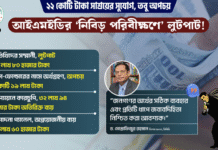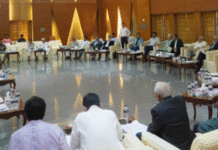Rabiul Islam runs a roadside shop of garment products in busy Motijheel commercial area. He makes a good business during weekdays with people buzzing the streets, but he is getting frustrated over repeated shutdowns that force him to stay home without any options for earning money his family badly needs.
“For me hartal means loss,” he tells bdnews24.com. “These shutdowns make people suffer, but politicians say they are for the people.”
Frustrated with the general strikes that routinely turn violent, he says his family depends on this shop as they have no other source of income.
Hundreds of thousands of similar shops run in the capital, Dhaka by people like Rabiul are made to count losses. While Rabiul has already faced a huge loss amid frequent shutdowns in recent months, he is worried about the future as he believes two days of general strike planned for Monday and Tuesday would put him into another round of financial trouble.
The opposition BNP and its partners have announced the shutdowns amid speculations that a new string of violence would take place. On Sunday, at least 19 vehicles were torched in Dhaka apparently by the strike supporters.
Not only Rabiul, people from other professions have raised their concern, saying the means of protest should not be only shutdown as it hoits every corner of society, from a roadside vendor to the top industrialist.
Apex business body FBCCI and apparel lobbies like BGMEA and BKMEA have urged the opposition to stop enforcing harsher protests such as general strike and blockades for the sake of economy.
In a joint statement, the Bangladesh Garment Manufacturers and Exporters Association (BGMEA) and Bangladesh Knitwear Manufacturers and Exporters Association (BKMEA) said on Saturday frequent strikes were hampering the export of garment products and import of raw materials.
Bangladesh earns $20 billion a year from the burgeoning garment sector by exporting products mainly to the United States and Europe. The sector employs about four million workers, mostly women, in the sector’s more than 4000 factories.
The groups’ statement said the strike was impeding growth, discouraging investment and slowing export putting employment at risk.
“If such destructive political programmes continue, the country’s economy would face a serious setback,” it said.
It also feared that if the ongoing political instability continueed the target of achieving 7.2 percent economic growth will remain elusive.
As the spectre of more chaos is coming alive, BNP Chairperson Khaleda Zia on Saturday warned the government of more strikes and blockades, no matter, what happens to a person like Rabiul.
“Some more lives have to be lost before we can say goodbye to this government. But we still have to take to the streets for the cause,” Khaleda told a rally in Manikganj on Saturday.
The opposition chief also declined to make any offer for talks with government to resolve current political crisis stemmed from the scrapping of a polls-time caretaker government system.
The government of Prime Minister Sheikh Hasina annulled the system in 2011, arguing that the provision goes against the spirit of the constitution as decided by the Supreme Court.
Meanwhile, BNP’s main ally Jamaat-e-Islami has been enforcing similar shutdowns seeking a halt to the ongoing war crimes trials involving the nation’s independence war in 1971.
Hossain Khaled, former president of Dhaka Chamber of Commerce & Industry (DCCI), said he was not happy with the way things were going on.
“Bangladesh’s growth has been in limbo due to its stagnant politics over last 40 years. The country’s growth would have been eight percent instead of six percent if only there had been a shift in political culture,” he tells bdnews24.com.
Khaled is for dialogue and thinks Parliament should be the ideal place to raise concerns and counter them.
“The parties which have been announcing harsher programmes should go to Parliament. There should be a change in the way protests are voiced and staged,” he said.
In the current week, the country would get only one working day, and that is Wednesday, if no more shutdown is announced in the meantime. Sunday was a public holiday because of the commemoration of the 93rd birth anniversary of the Father of the Nation Bangabandhu Sheikh Mujibur Rahman. There is a daylong shutdown in Dhaka district called by the BNP for Thursday.
Khaled says he is afraid that one of his factories might lose at least $1 million because of the work hours to be lost this week.
Banks are also bleeding.
Abdul Karim, a branch manager for a private bank in the capital’s Uttara, says transactions drop to less than half on strike days and regular clients usually don’t visit them.
“Even corporate customers don’t come unless there are emergencies. Shutdowns are not only harmful but annoying too.”
Auto-rickshaw driver Shahinur Islam also feels perturbed.
“One day of hartal brings three days of losses. The auto-rickshaw owner does not let me drive it during the strike, so I make no money. The traffic gridlock increases the next day, so I am forced to work less,” Shahinur says.
“The politicians must know that none likes shutdowns,” he says.
Ahmed Siddiqui, who owns a rice silo in Karwan Bazar, says he needs to count extra fares for trucks carrying rice to his depot.
“They increase fares as soon as a shutdown is announced. They charge an additional Tk 2000 at least, for travelling from rice producing areas like Naogaon, Kushtia and Chapainawabganj,” he says.
“I am doubly troubled. I can’t sell rice on the shutdown day and cannot recover losses because of excessive competitions the next day,” he says.
A homemaker like Amina Ahmed also feels the pinch.
She says while shutdowns are draining more money as it impacts the prices of daily commodities, she always remains worried thinking of safety of her family members who go out for work.
“I feel insecure. Those who announce shutdowns should think of how people suffer. They should give it a thought.”
Source: bdnews24










